What Is The Arrestee DNA Collection Law In Your State?
By Charlotte Spencer
The United States’ DNA database laws, many may be surprised to find, are not uniform across the country. Rather, they are a patchwork of laws that vary in when DNA can be taken, why DNA can be taken, how DNA information can be kept and what the qualifications are for labs that handle it. Your rights as a victim of a crime or as a person who has been accused of a crime vary a great deal depending on what state you are in. In many states, law enforcement is authorized to collect DNA upon arrest, but which crimes qualify are very different from state to state.
In some states a probable cause hearing is required first, but in others it is not. In some states such a determination is made by a judge, while in others it is made by a grand jury. Still other states specify in their laws when the collected DNA can be analyzed or uploaded. Even among these states there is no uniform law. Some allow this to happen right away under certain circumstances. In others, they must wait until the person has been charged. Some include juveniles in such collections, and others do not. This is just a small sampling of the differences you will find when combing through state law on DNA collection upon arrest.
What is the law in your state? Read on to find out.
Is There A DNA Arrestee Law In Your State?
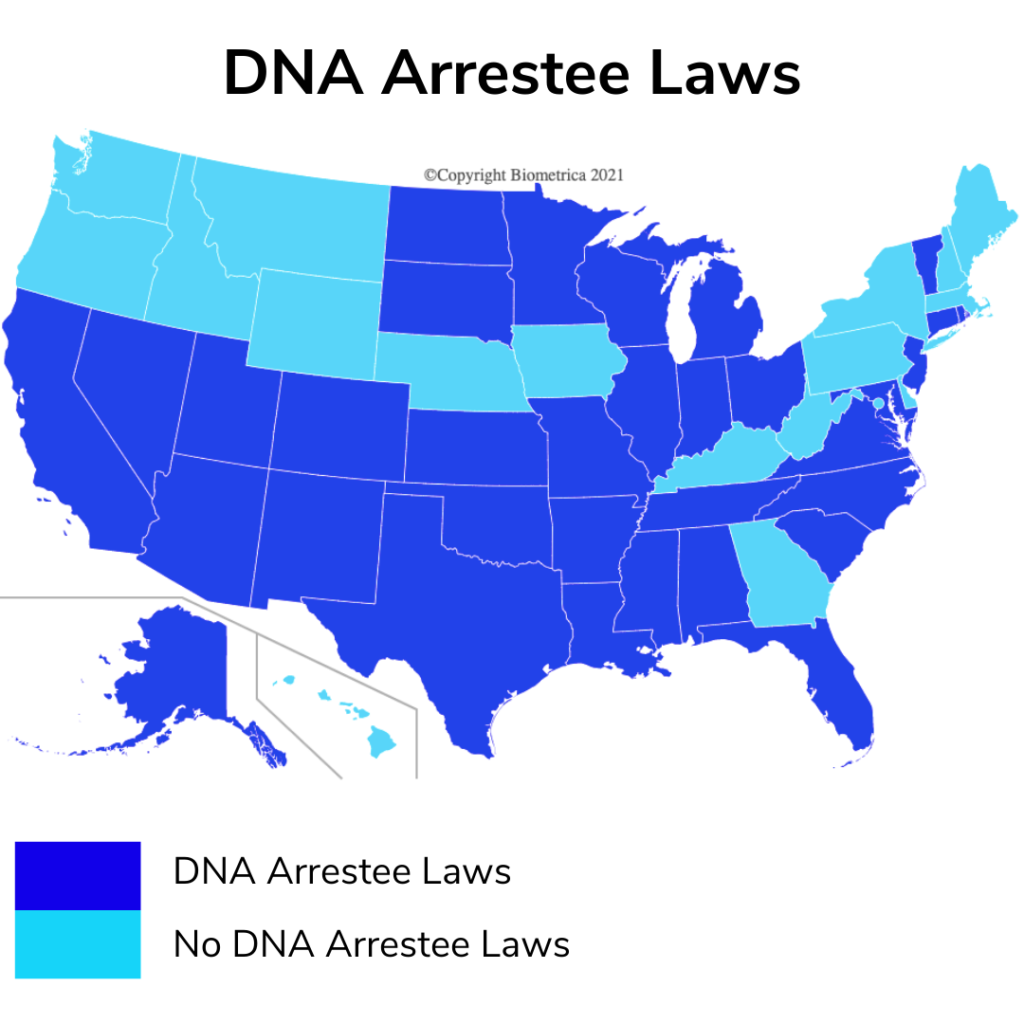
The map above shows which states have laws specifying instances when law enforcement can collect DNA from an arrestee. All states allow for DNA collection under certain circumstances, in many cases upon conviction or parole. If a state is not marked above, it simply means that the laws of that state do not specify DNA collection upon arrest, not that they don’t address DNA collection at all. As you can see, most, but not all, states allow for DNA collection upon arrest in some cases. The circumstances under which this is allowed vary by state. It is also interesting to note that states that allow this are often clustered amongst other states that allow it, and states that don’t allow this are often clustered among other states that don’t.
What Crimes Qualify For Collection Upon Arrest In Your State?
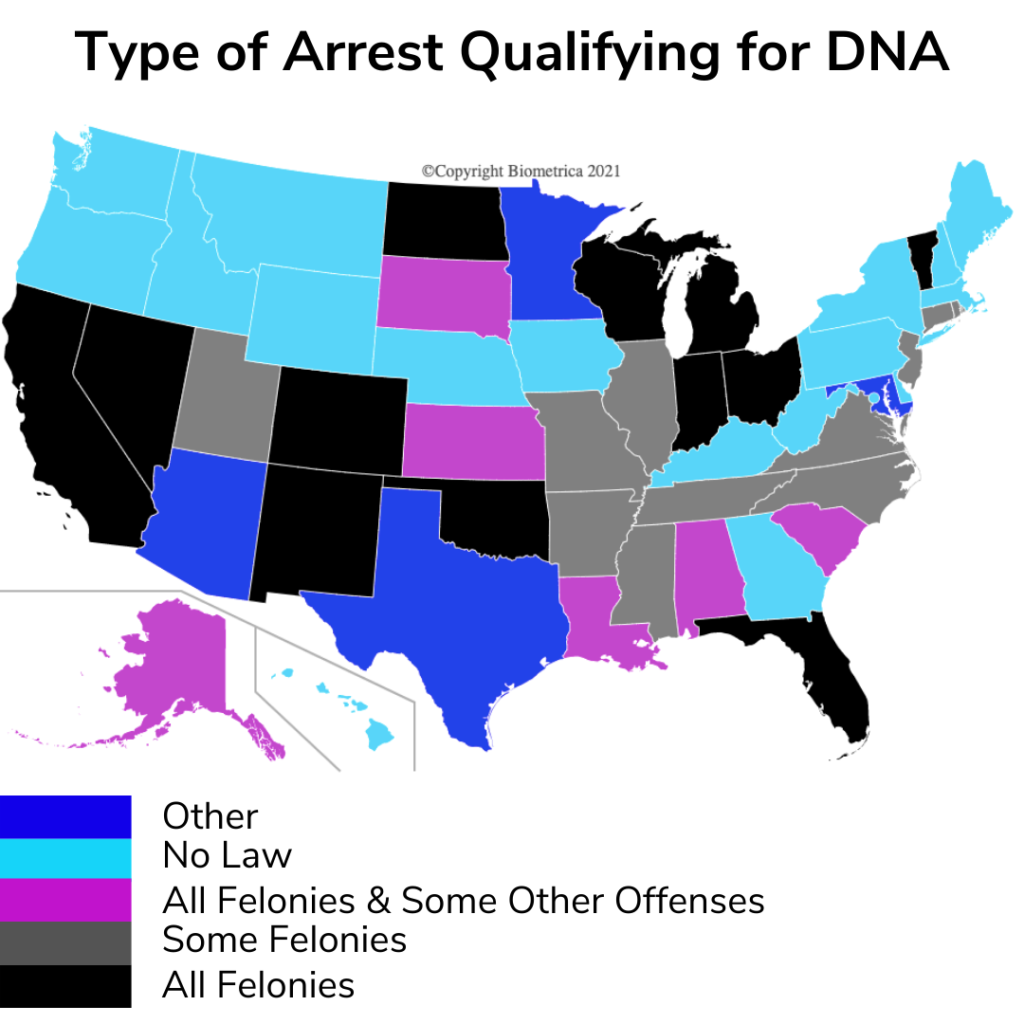
There is no consistent pattern from state to state in terms of which crimes qualify for DNA collection upon arrest. In some states all felonies qualify. In other states only certain felonies qualify. Even in these states, which felonies qualify is not consistent. In still other states all felonies and some misdemeanors qualify. In other states some felonies and some misdemeanors qualify, meaning that you will see, in certain instances, misdemeanors that qualify and felonies that don’t. Certain states, such as Alabama, apply this to all felonies and all sexual offenses regardless of whether they are felonies or misdemeanors. Other states, like Alaska, apply this to all felonies and all crimes against a person regardless of whether they are felonies or misdemeanors.
Some states focus on specific crimes that demonstrate behavior known to commonly escalate into more serious offenses. For example, in addition to murder, sex crimes and burglary, Arizona applies this to certain misdemeanors such as indecent exposure, public sexual indecency and prostitution. In addition to all felonies, South Carolina applies this to eavesdropping, peeping and stalking. For more on the link between peeping and more serious crimes see this article on the link between voyeurism and sexual assault, or this article on the link between voyeurism and serial killing.
Does The Law In Your State Include Juveniles?
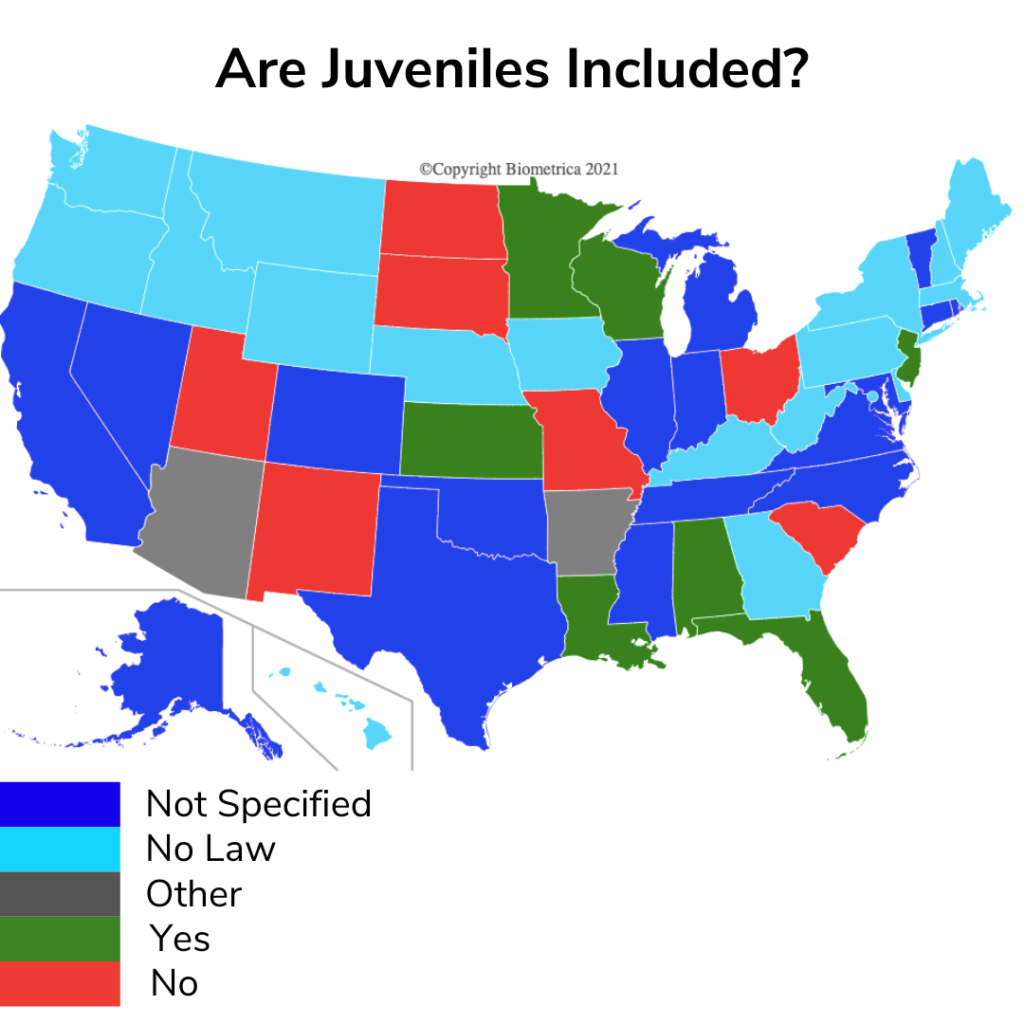
Some states’ arrestee DNA collection laws include language that specifically excludes juveniles from DNA collection upon arrest. Others have language that specifically includes them. In many states (marked in the darker blue in the map above) this is not specified in the language of the arrestee DNA collection statute in that state. In such states, there are often other statutes or case law relating to juveniles in the state that this article doesn’t go into. Other states (in grey) have specific intricacies involving juvenile arrestees and DNA collection. For example, in Arizona this law applies to adults at booking, and to juveniles at charging. In Arkansas, this applies to juveniles only if they are charged as adults.
When Can They Collect It And When Can They Process It?
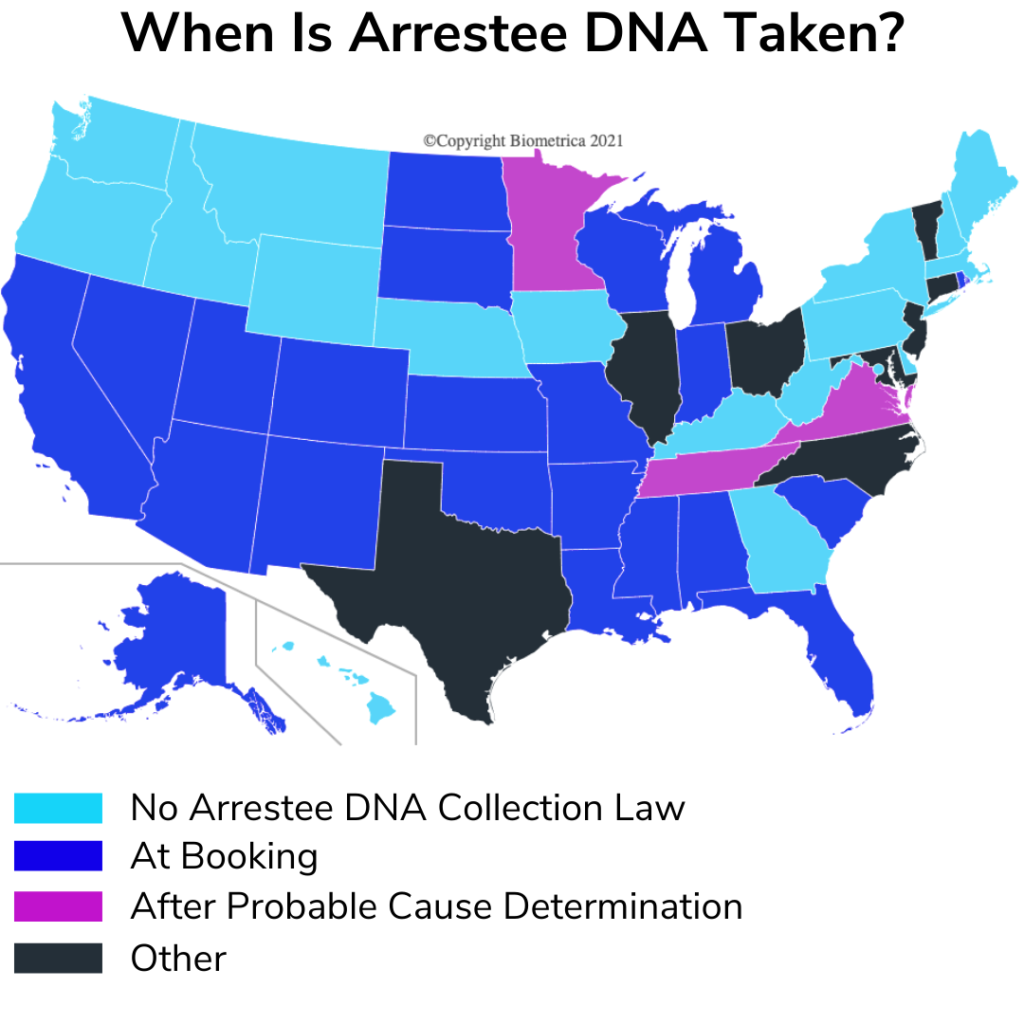
States also vary a large amount in terms of when arrestee DNA can be collected and processed. Many allow DNA collection at booking. Others allow DNA collection upon charging, prior to release, or after a probable cause hearing. It’s important to note that just because a state allows collection at a certain time this does not necessarily mean that they allow uploading or processing DNA at this point. Some make no distinction between collection, processing and uploading, but some do. The map above shows when collection is allowed, but does not include details on when processing and uploading is allowed. For example, Indiana and Colorado are both marked as blue because they both allow collection at booking. Indiana allows analysis and upload as soon as the sample is collected if the arrest was made with a felony warrant, but if the arrest was done without a felony warrant they must wait until a court has found probable cause for the arrest. New Mexico, Wisconsin, Oklahoma and Nevada also have laws similar to this. In Colorado, although DNA can be collected at booking, it is filed and maintained in the state index when the offender has been charged with a felony. Ohio, on the other hand, requires the sample be processed no later than 15 days after it is collected.
What About The Expungement Of Collected DNA?
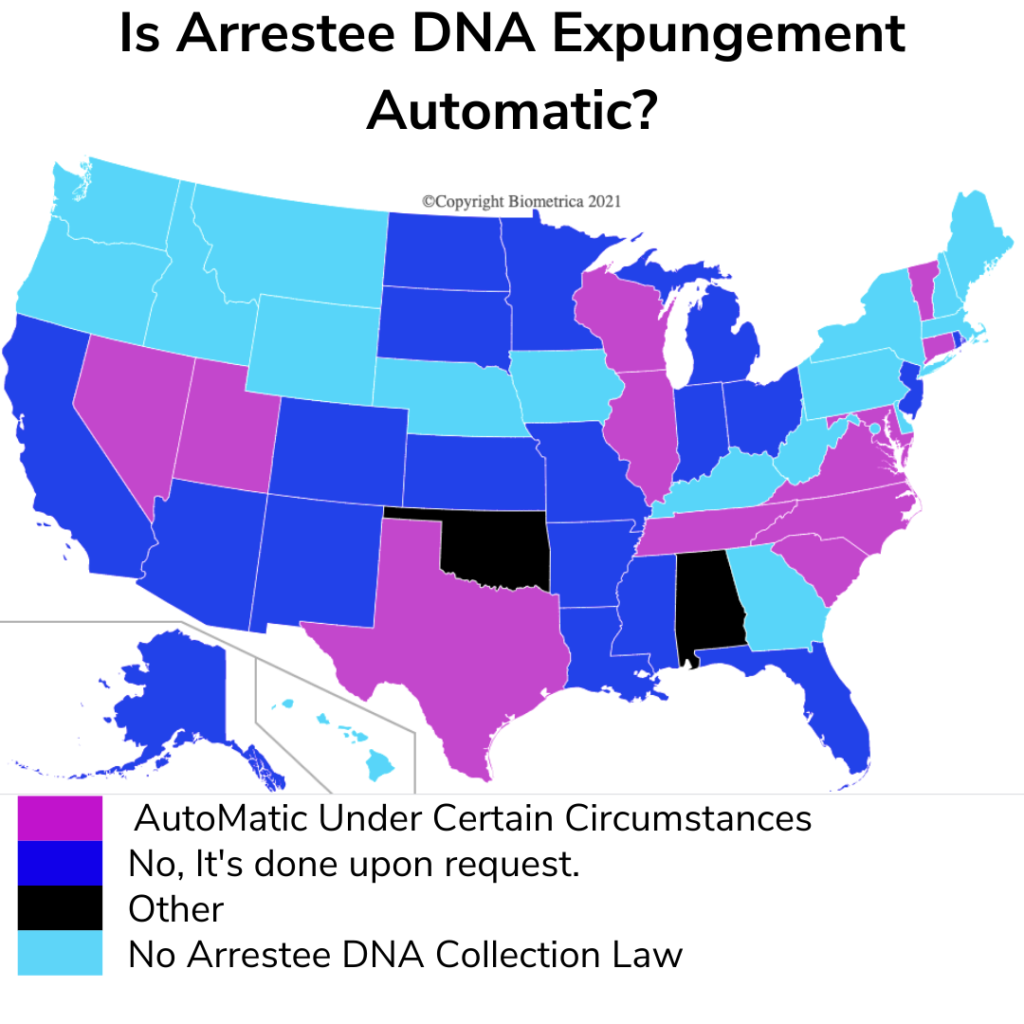
Finally, states also vary on how a DNA record can be removed and under what circumstances. Many, shown in the darker blue on the map above, allow for the expungement of arrestee DNA records upon request. This, of course, would depend on the circumstances surrounding the case. It is not to say that every request would be granted in every situation. Other states expunge such records automatically, depending on the circumstances. For example, in Utah, arrestee DNA is automatically expunged if criminal charges are not filed within 90 days of booking.
Where Can I Find Out More About This?
For more on DNA collection laws by state, see this excellent resource from the National Conference of State Legislatures. For the most up to date information on your state, or to find out about pending legislation, check the website for your state legislature.
The information provided in this article should not be considered legal advice or a substitute for legal advice. Biometrica is not a law firm and cannot offer legal advice.